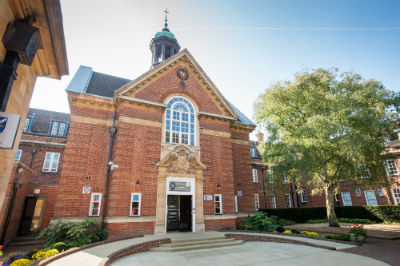Recycling Brecht
15th Symposium of the International Brecht Society
25-29 June 2016
St Hugh's College, University of Oxford
Welcome | Willkommen
On the sixtieth anniversary of Brecht’s death, the IBS Symposium turned its attention to ‘Recycling Brecht’, exploring the myriad ways in which Brecht can be viewed as both recycler and recycled. Participants were invited to reflect, on the one hand, how Brecht engaged in a process of ‘recycling’ through his tendency to revamp and recalibrate diverse source materials. On the other hand, the theme encouraged a consideration of how Brecht’s ideas and practices have been re-thought, re-imagined and adapted.
The International Brecht Society (IBS) and the Writing Brecht project at the University of Oxford, in association with the Oxford Research Centre in the Humanities (TORCH), hosted scholars and artists in theatre, performance, and other cultural fields at the 15th IBS Symposium on 'Recycling Brecht' from June 25-29, 2016.
Some 150 Brecht specialists attended the symposium, with over 100 papers on 'Recycling Brecht'. These were on themes including: Brecht Abroad (from South America to the Indian subcontinent); Brecht as Recycler (with special sessions on the Modelbooks and the Lehrstück); Brecht in recent and contemporary German theatre (including Castorf's Baal scandal); filmic, visual and technological recycling; Teaching Brecht; and Brecht and Translation.
Keynote speakers were Amal Allana (longtime theatre director and former chairperson, National School of Theatre, India), Hans Thies Lehmann (theorist of postdramatic theatre and former President of the IBS) and Pulitzer Prize-winning dramatist and translator Tony Kushner.
The programme also featured workshops, masterclasses and round table discussions with theatre practitioners, translators and writers. Speakers included: Jürgen Kuttner (radio personality, director, artist), Dominic Muldowney (composer, longtime director of music at the National Theatre), Mark Ravenhill (playwright), Simon Stephens (playwright, and author of the version of The Threepenny Opera running from May-October 2016 at the National Theatre), and Di Trevis (veteran director and teacher).
A broad programme of cultural events accompanied the academic programme, including a production of a new version of Fatzer: Downfall of an Egoist, a song recital by Robyn Archer, and a performance by mezzo-soprano Lore Lixenberg of Brecht songs including newly commissioned settings by composers Niels Rønshold and Richard Thomas. John Hanse and Phoebe Zeitgeist Teatro contributed experimental theatre performances and the programme also featured short films and a cabaret evening by Sphinx Theatre.
The IBS was founded in 1970 on the model of Bertolt Brecht's own unrealised plans for a 'Diderot Society'. A non-profit, educational organisation with a world-wide membership, the Society promotes the performance and understanding of Brecht's texts and addresses issues of politics and culture in contemporary life. It also encourages and supports local, national, and regional groups with related goals. In Brecht's spirit of collaborative work, the IBS hopes that this Society will function as a clearinghouse, facilitating international contacts and exchange. It is committed to maintaining Brecht as a living force in the theatre as well as in the political and cultural arenas, so that he remains - as he wished - an 'unsettling presence'...
Click here for more information on the International Brecht Society.
Organising Committee
David Barnett (University of York), Stephen Brockmann (Carnegie Mellon University), Anja Drautzburg (University of Oxford), Steve Giles (University of Nottingham), Tom Kuhn (University of Oxford), Stephen Parker (University of Manchester), Charlotte Ryland (University of Oxford), Marc Silberman (University of Wisconsin, Madison), Hannah Vinter (University of Oxford), Erdmut Wizisla (Bertolt Brecht Archive, Berlin).
The 15th International Brecht Society Symposium was supported by the Arts and Humanities Research Council (AHRC), the International Brecht Society, the Writing Brecht project, St Hugh's College Oxford, The Oxford Research Centre in the Humanities (TORCH) the Alfred Toepfer Foundation, the North Wall Arts Centre, Bloomsbury Pulbishing, and Suhrkamp.

